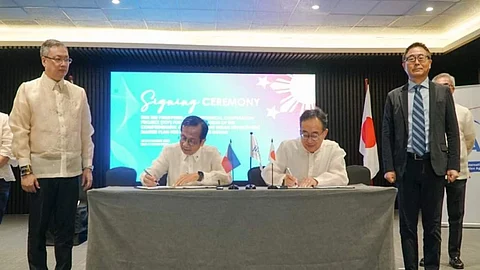

THE vision of making Metropolitan Davao a highly industrialized and globally competitive metropolis is underway, following the ceremonial signing of the Record of Discussion (ROD) between the National Economic Development Authority (Neda) and the Japan International Cooperation Agency (Jica) on Friday, November 10, at SMX Convention Center, Davao City.
Led by Neda Secretary Arsenio Balisacan and Jica Chief Representative Sakamoto Takema, the signing marks the beginning of the formulation of the Comprehensive and Sustainable Urban Development Master Plan for Metropolitan Davao through the Philippine-Japan Technical Cooperation Project (TCP).
The event was also graced by Vice President Sara Duterte, together with the Ambassador of Japan to the Philippines Koshikawa Kazuhiko, who both expressed optimism that the strong partnership between the Philippines and Japan will facilitate holistic development for Metropolitan Davao.

In her message, Vice President Duterte expressed her profound gratitude to the government of Japan and Jica, noting that the development projects for Metropolitan Davao would not be realized without their assistance.
“I would like to thank the government of Japan for always holding the hand of Davao City throughout the years and now holding the hand of Davao Region,” she said.
“Over the years, Jica has been an invaluable development partner in the Davao Region, providing technical assistance and financial support for various projects,” she added.
Sustainable and balanced urban planning
The vice president believed the master plan formulated through the ROD would enable sustainable and more balanced urban planning and development in the region.
“The master plan covers various critical aspects, including developing agricultural and commercial industries, climate resilience, technological balance, and integrity. It will assist us in planning for educational growth and development, physical and technological connectivity, human and transportation mobility, and the enhancement of integrated health and social services,” she said.
Meanwhile, Neda Davao Regional Director Maria Lourdes Lim underscored the role of ROD as an agreement document in the formulation of the master plan for Metropolitan Davao.
She explained that outlined in the ROD are the administration of the project implementation, implementing agencies, planning period, endorsement of the project output, harmonizing with ongoing and/or under preparation plans and projects, tax assumption, promotion of public support, mutual consultation, Special Presidential Authority (SPA), environment and social consideration, and gender equality and women empowerment.
These components, according to Lim, will guide the formulation of a master plan for Metropolitan Davao by the TCP with the assistance of urban development experts from Japan and with general support from the government of Japan.

Roadmap to long-term work plan
Moreover, Balisacan said that the master plan will serve as a roadmap to a long-term work plan and a foundation “that will support and guide the mobilization of resources and the delivery of key services of the Metropolitan Davao Development Authority (MDDA) across the metropolis.”
As the master plan aims to solidify the cooperation and partnership of the LGUs comprising Metropolitan Davao, Balisacan urged the local chief executives to give their all-out support to the planning period to realize the development prospects of metropolitan Davao.
The master plan ensures sustainable urban development for Metropolitan Davao in areas of land use planning, agri-ecotourism and urban greening, Davao Gulf coastal resource management, and joint service delivery ofurban facilities and services, such as transport and traffic, housing, solid waste and water waste, digital connectivity, water, energy, public security, disaster risk reduction, and flood control.
On the other hand, Takema said that Jica has been a partner of Mindanao in the development and peace process.
Takema cited the ongoing projects and the proposed projects they have identified and are currently undertaking for Mindanao.
Infra-development modernization for Davao City
In Davao Region, Takema said that Jica is an active partner of the City Government of Davao, especially for its Infrastructure Development Modernization for Davao City (IM4Davao) in 2016.
With this prior partnership, Takema said, "The government of Japan and Jica have agreed to further expand our cooperation with this new master plan project, for this time Metropolitan Davao.”
He added that, with the successful results of the developments that they implemented in Davao City it would “create more and more big projects along with the newly started.”
Takema called on all stakeholders to work together to make the formulation of the master plan and its soon-to-be implementation successful.
“I am quite sure that we can see the brilliant future for Metropolitan Davao. [A] metropolitan area that is livable, smart, efficient, peaceful, economically viable, environmentally sound, resilient, and inclusive,” Takema said.
Metropolitan Davao was institutionalized through Republic Act 11708, or the Metropolitan Davao Development Authority Act, signed by former President Rodrigo Duterte in April 2022.
It is composed of 15 LGUs from the Davao Region, namely Davao City, the cities of Tagum, Panabo, and Island Garden City of Samal, and municipality of Carmen in Davao del Norte; Mati City in Davao Oriental; Digos City and municipalities of Santa Cruz, Hagonoy, Padada, Malalag, and Sulop in Davao del Sur; Maco in Davao de Oro; and Sta. Maria and Malita in Davao Occidental.
According to Lim, these areas are the urban corridor of Davao Region, especially from Digos City to Davao City.
Lim added that with the establishment of Metropolitan Davao, the urban development will be dispersed to other potential growth areas, such as in Mati City, Maco, and Malita. PIA DAVAO